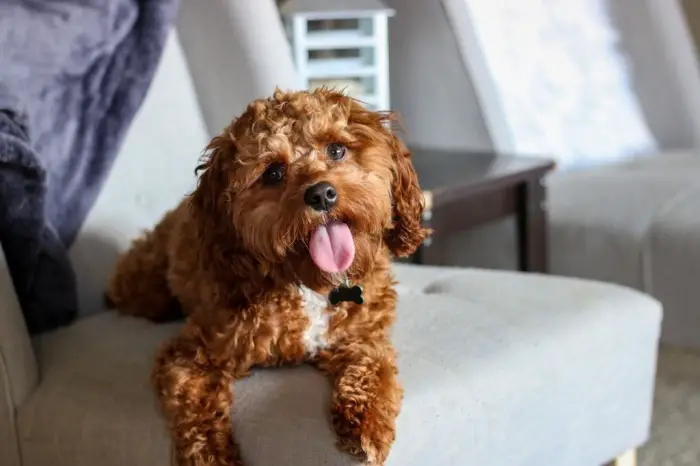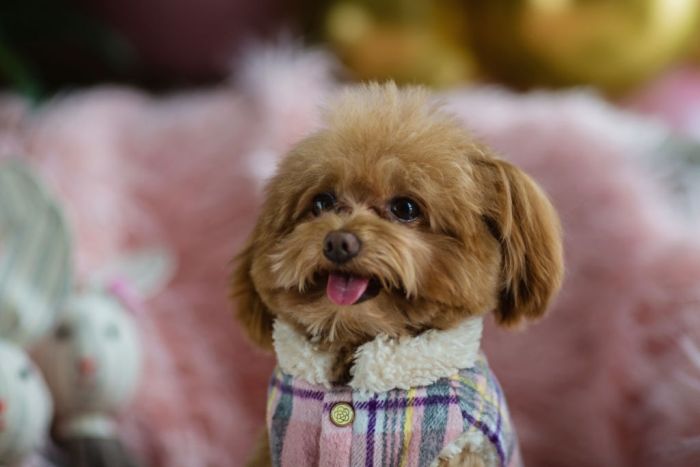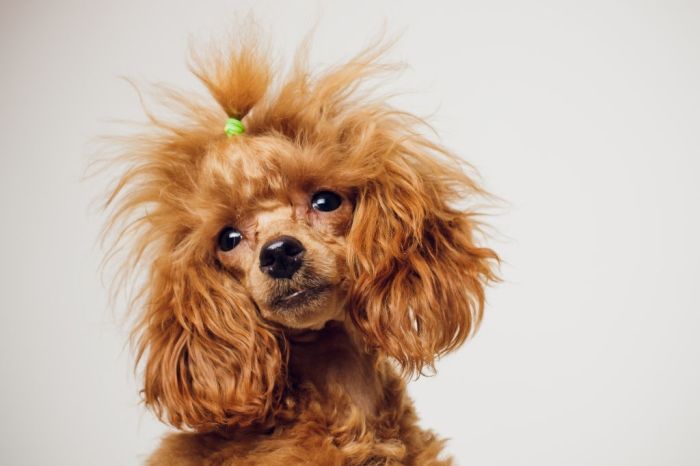Poodles are one of the most intelligent dogs to have as pets. They have a long history of serving alongside hunters and military men. They are also a favorite dog show contenders for their graceful stance and elegant stature. But what if you have a limited living space? Can you still get a poodle as a pet? Yes, it’s possible with the teacup Poodle!
Teacup Poodles are tinier versions of the loveable, intelligent, loyal and adorable Poodle. Their miniature sizes make it possible for them to join their owners anywhere they go. These dogs can also adapt to various living conditions or spaces. It no longer matters if you have a huge house or a small apartment. With these tiny puppies, you can have the Poodle in all sense except for the size! Are you ready to welcome them into your home? Read on for more information on caring, grooming, feeding, and training these fantastic teacup puppies.
What is a Teacup Poodle?
The tiniest version of the Standard Poodle is the teacup Poodle. These are very cuddly creatures that love attention and crave affection. Like their regular-sized cousins, these cute puppies are very social, and they have an irresistible personality. Many pet owners would like to have a Poodle for companionship, but these dogs can be extremely loyal and take the role of an unassuming watchdog to protect their owners.
What makes these little pooches extra special is that they will stay tiny even when they are fully grown adults. They have the same fluffy features, intelligent eyes, social personality, and mild temperament as the Poodle, but they will be like little puppies their whole life!
What Does A Teacup Poodle Look Like?
There is no official breed standard when it comes to teacup Poodle puppies. They are expected to look exactly like their standard Poodle cousins but in a tiny size. The breed remains very elegant looking and always posed no matter their size. They have small, dark eyes that are always alert and intelligent. It also features a long muzzle and floppy, furry ears. Teacup Poodles are about 9 inches in height and about 6 pounds in weight in adulthood. It is much smaller than the standard recognized for Toy Poodle, which is 10 inches.
The toy poodles sport a thick and curled coat that does not shed. These dogs are hypoallergenic and the perfect breed for people with allergies. They come in various colors, including black, white, blue, silver, apricot, red, beige, and brown. Pure teacup Poodles come in solid colors only. When you are offered a teacup puppy Poodle with mixed coat colors, it is not purebred and is probably a mixed breed.
The Temperament of a Teacup Poodle
Intelligent, highly responsive, sweet, perky, cheerful, and lively – these are the most common descriptions when you seek out the temperaments of the teacup Poodle. They are brilliant little canines, making them one of the most trainable breeds. When properly socialized, they are keen, amusing, delightful to have around, and are very social among other humans and pets. They also make excellent tiny watchdogs.
Though they are tiny, teacup Poodles tend to develop the big-dog attitude. It is not a bad thing, but some things are just fine for larger dogs and might not be safe for these little ones. The teacup Poodle’s big-dog disposition will keep its owners on their toes, ensuring that they remain safe and unscathed. Look out for your teacups trying to jump on or off the couch. It might lead to injuries or permanent bone damage.
They might also become aggressive and challenge larger dogs when they take on a protective stance. It is a common scenario with teacup dogs; thus, pet owners must assume the “pack leader” role in a careful manner. Without proper rules to follow, or if they do not know their limits, these dogs can develop undesirable behaviors. They might become sensitive to others, develop obsessive barking; also, teacup dogs quickly develop separation anxiety, so never leave them alone for long periods.
Generally, teacup Poodles are fabulous with children, but they are best for families with older children who know how to display leadership over these tiny canines.
How Long Teacup Poodles Live?
A teacup Poodle can live a long life compared with other teacup puppies. They are expected to live from 12 to 14 years.
Common Health Problems of a Teacup Poodle
Teacup puppies are at a higher risk of developing various health conditions than their regular-sized counterparts. These health problems can be fatal if not addressed early; thus, pet owners must give their teacup pets extra care and attention. Here are some conditions that you must look out for in your teacup Poodles.
Elbow and Hip Dysplasia
The teacup Poodles’ tiny structure makes them prone to bone issues which can be painful when not addressed early. This condition causes the elbow or hip joints to become unstable. Your pet may experience strain in movement and may not be able to climb up or jump down anymore.
Patellar Luxation
Another bone condition that is common among teacup Poodles is slipped kneecaps. It is often caused by dangerous jumps and stunts that your tiny dog pulls off. Teacups have tiny bones that are easily breakable and more fragile than regular dogs.
Adrenal Gland Issues
Pet owners need to look out for includes Addison’s disease and Cushing syndrome. These conditions affect their adrenal glands and can be fatal if left untreated.
Hypothyroidism
This condition is expected in the breed and is caused by an underactive thyroid gland. It can lead to other conditions such as lethargy, obesity, epilepsy, hair loss, pyoderma, hyperpigmentation, and other skin problems.
Legg-Perthes Disease
This condition is common in toy and teacup breeds. Canines with this condition have a decreased supply of blood on the top of the femur, leading to bone damage. Pet parents should look out for signs of this disease, such as limping and loss of muscle strength in the leg when the Poodle puppies reach four to six months old. Veterinarians can correct the condition via surgery to remove the damaged femur.
Progressive Retinal Atrophy
This eye condition involves the slow deterioration of the canine’s retina. Dogs become night blind early in the disease, and when it progresses, your pet can soon lose its sight.
Sebaceous Adenitis
Another common skin issue in Poodles, especially the standard breed. It is a genetic condition that affects about 50 percent of all Standard Poodles. It is challenging to diagnose and is often mistaken for allergies or hypothyroidism. Dogs with this condition often have dry, scaly skin and hair loss on the head, back and neck. In severe cases, the skin can thicken, have an unpleasant odor and infection. There are several treatment options if your dog has this condition.
Epilepsy
This health problem, particularly Idiopathic Epilepsy, is one of the common causes of seizures in Poodles. It is genetic and can cause seizures that vary from mild to severe. It can be frightening to see a canine having seizures, but dogs with idiopathic epilepsy have a good prognosis for the long term. Likewise, seizures may also be due to other problems like infectious diseases, metabolic disorders, head injuries, etc.
Pet owners should never forget that teacup dogs are more sensitive and delicate than any other dog breed. They can easily get injured from simple activities, improper handling, and basic negligence. If you are caring for a teacup Poodle, be cautious of changes or transitions.
Everything must have significant preparation to prevent a fatal stress reaction in the canine’s tiny body. As much as possible, avoid sudden diet changes, improper medicinal dose, and other similar circumstances. Though there is not enough evidence that these can cause serious health problems, pet owners must understand that teacup Poodles can fall victim to the most superficial health issues.
There are also significant differences in health concerns between teacup dogs and the runts of the litter. Be sure to scrutinize your teacup Poodle as unscrupulous breeders will fob off runts are teacups.
Feeding Your Teacup Poodle
The feeding requirements of a teacup Poodle are not very demanding. They have tiny bodies; thus, their need for food is also on the tiny portions’ side. Teacups need about 250 calories per day, and this is equivalent to 1 cup of high-quality kibble. Find a dog food that is specifically formulated for toy and teacup-sized breeds. These will ensure that the dogs are getting the right amount of nutrients and calories for their needs.
When caring for a teacup Poodle, they mustn’t miss a meal. These little dogs are prone to fatal hypoglycemia. The ideal feeding schedule for teacup dog pets is to split it into four meals a day. You can give the first meal at 7:00 AM, then at 11:00, at 3:00 PM then the last meal of the day at 7:00 PM. You may also reward them with treats or fruit snacks when they follow a command or exhibit good behavior.
Exercising Your Teacup Poodle
Teacup dogs do not need a great deal of exercise or physical activities. But despite its diminutive size, your teacup Poodle may still want to walk and exercise a bit. Take them for a 30-minute daily walk and make this an opportunity to bond with them. Physical activities such as walking and exercise also increase their mental stimulation as they are introduced to new sights and experiences.
Make sure to take breaks to rest during your 30-minute walk to prevent overexertion in your tiny pets. You may also split it into several activities like a morning walk, mid-day play, and an afternoon walk.
Tips for Training A Teacup Poodle
Poodles are brilliant dogs. They are naturally intelligent and are very easy to train. It is one of the reasons why people love having them. If you haven’t trained a dog before, you will be delighted to see how quickly Poodle learns your commands. However, it would be best if you were firm in handling your teacup Poodles during training. These dogs love to please and respond well to positive reinforcement – whether it is treats or praises.
Distribute sessions into five-minute short training two to three times per day to avoid over-tiring and stimulating time. Your teacup and toy Poodle dogs also need early socialization for them to have a grasp of the people around them and their surroundings in particular. Introduce them to other people and pets around the home or neighborhood to learn how to interact and behave in every situation appropriately.
Grooming Requirements for Teacup Poodles
Poodles are lovely creatures to groom. It is one of the favorite activities of owners regarding caring for their teacup and toy Poodle puppies. These dog breeds have a thick coat which you can clip in various ways. You can change their hairstyle every time they need some grooming.
Now, if you do not want to experiment with your pet’s hairstyles, you should still brush them regularly. Teacup Poodles need to have regular brushing on their thick fur. Though they do not shed, their hair can become knotted and matted. Brushing their coat at least two times a week will prevent this from happening and keep their coat soft and shiny.
You should also check on your pet’s ears and nails. If you hear a clicking sound when they walk around the home, it might be time for a clipping. Some pet owners delegate this task to professional groomers because they can be sensitive when handling their paws. Clear your dog’s outer ear with a mild cleanser, and make sure no liquid gets into the ear canal. Brush their teeth regularly as well to prevent decay and infection. Finally, gently wipe their tear stains and the gunk below their eyes. Toy Poodle puppies and teacups often have these stains in their eyes in the morning.
Are Teacup Poodles A Good Family Pet?
Poodles love their human companions, and they make great pets for everyone, including families. However, teacup Poodles are more fragile than their standard Toy Poodle cousins, so extra care is needed in handling them. Their tiny sizes make them an attractive option for those living in city apartments, but they also do well in the countryside. These dogs do not need extensive exercise and will be happy with a short daily walk or play with their owners.
Teacup Poodles are not to be left alone for long periods. They are not ideal for families out for most of the day because they need someone to cuddle with now and then. They are incredibly loving and affectionate lap dogs – you can take them with you when you need to go out!
On the other hand, teacup Poodles lack the patience that Standard Toy Poodles have, especially with young children. They can turn cranky and intimidated when held by shaky little hands, but you can correct it with early socialization.
Ideally, these tiny toy Poodle puppies and teacups are most recommended for families with older children. They are ludicrously small and fragile, but they can have that Small Dog Syndrome. Rough play and incapable hands can lead to broken bones, injured organs, and brain damage.
Where to Find Teacup Poodle Puppies?
If you want to have a teacup Poodle or miniature toy Poodle puppies of your own, you can adopt or buy from a reputable dog breeder. Prices for these tiny canines can be as high as $2000.
Avoid seeking out puppy mills and irresponsible breeders. These venues often pass off runts and sickly puppies as “teacup Poodle or toy Poodle puppies.” The puppies can come with various health problems that will only worry new pet parents.
You may also check out rescue centers in your locality for teacup and toy Poodle puppies. The fee for the adoption process is around $400.
While caring for your teacup and toy Poodles pet, expect to spend around $800 for the food, grooming, and veterinary fees, toys, and other pet essentials.
Do teacup poodles bark a lot?
Small dog breeds, including teacup and toy Poodle puppies, often get a reputation for barking. It might be because they are excited to play or are welcoming a guest. They may also be bored or anxious because they are left without attention or exercise for some time. Teacup Poodle puppies will bark as much as other dogs in the same situation. If their bark bothers you, training them to behave well and calm will lessen their barking.
What is the smallest size of Poodle?
There is no standard breed size for the smallest Poodles. A teacup Poodle typically grows up to 9 inches in height and 6 pounds or less in weight. They are much smaller than the toy Poodle which is around 10 inches in height and at least 7 pounds in weight.
Does teacup Poodle Shed?
One of the best advantages of choosing teacup Poodle puppies as a pet is that they do not shed, and they are hypoallergenic. They are well-suited for people with allergies. They may have dead fur, but it will only fall out when they have their regular brushing.
Summary
Poodles are an adorable dog breed. Even more adorable are their teacup varieties. A teacup Poodle has the same intelligence, temperament, and features, but they are very tiny. These dogs can quickly adapt to various environments and require minimal grooming or caring needs. They love having people around; thus, they are not recommended to people who are always out.
Teacup Poodles need careful attention because of their diminutive size. These dogs are also at a high risk of some health conditions common in Poodles because of their bodily structure. But despite being fragile little canines, teacup Poodles remain to be full of life and love. They can give owners their undying love, affection and even serve as their unassuming protectors!
Related Reads:
- 8 Popular Teacup Dog Breeds
- 5 Types of Poodles – Different Sizes of the Doodles
- 300 Popular and Best Poodle Name Ideas
- Interesting Facts About Poodle Dogs
- The Adorable and Gentle Teacup Maltipoo




